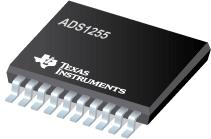●The ADS1255 and ADS1256 are extremely low-noise, 24-bit analog-to-digital (A/D) converters. They provide complete high-resolution measurement solutions for the most demanding applications.
●The converter is comprised of a 4th-order, delta-sigma (ΔΣ) modulator followed by a programmable digital filter. A flexible input multiplexer handles differential or single-ended signals and includes circuitry to verify the integrity of the external sensor connected to the inputs. The selectable input buffer greatly increases the input impedance and the low-noise programmable gain amplifier (PGA) provides gains from 1 to 64 in binary steps. The programmable filter allows the user to optimize between resolution of up to 23 bits noise-free and data rate of up to 30k samples per second (SPS). The converters offer fast channel cycling for measuring multiplexed inputs and can also perform one-shot conversions that settle in just a single cycle.
●Communication is handled over an SPI-compatible serial interface that can operate with a 2-wire connection. Onboard calibration supports both self and system correction of offset and gain errors for all the PGA settings. Bidirectional digital I/Os and a programmable clock output driver are provided for general use. The ADS1255 is packaged in an SSOP-20, and the ADS1256 in an SSOP-28.
● 24 Bits, No Missing Codes
● All Data Rates and PGA Settings
● Up to 23 Bits Noise-Free Resolution
● ±0.0010% Nonlinearity (max)
● Data Output Rates to 30kSPS
● Fast Channel Cycling
● 18.6 Bits Noise-Free (21.3 Effective Bits) at 1.45kHz
● One-Shot Conversions with Single-Cycle Settling
● Flexible Input Multiplexer with Sensor Detect
● Four Differential Inputs (ADS1256 only)
● Eight Single-Ended Inputs (ADS1256 only)
● Chopper-Stabilized Input Buffer
● Low-Noise PGA: 27nV Input-Referred Noise
● Self and System Calibration for All PGA Settings
● 5V Tolerant SPI-Compatible Serial Interface
● Analog Supply: 5V
● Digital Supply: 1.8V to 3.6V
● Power Dissipation
● As Low as 38mW in Normal Mode
● 0.4mW in Standby Mode



